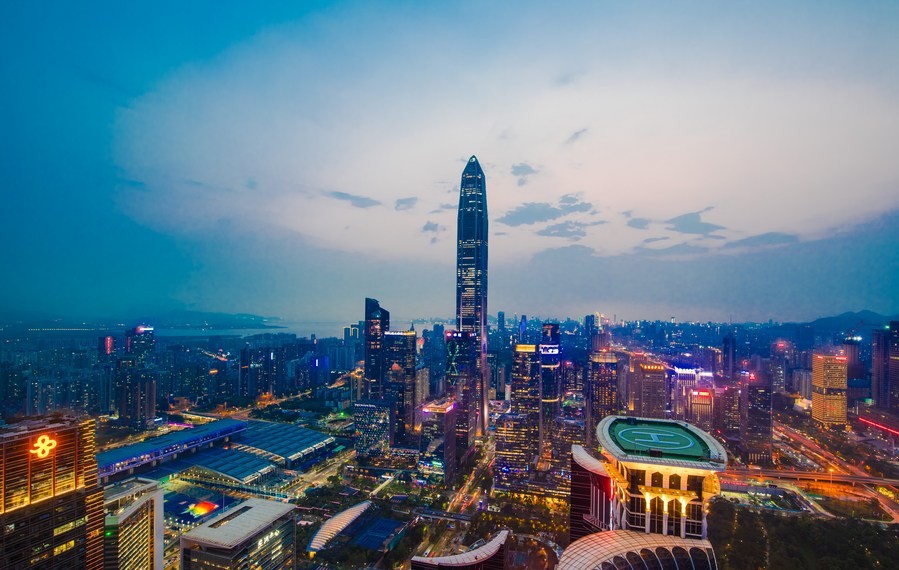Many around the world, especially in the United States, are still trapped in a benighted, primitive and perniciously toxic superstition that, of all the available choices, a democratic free market system is the best and most moral form of government.
But 40 years of reform in China have shown that this is not true. Socialism with Chinese characteristics has delivered far better results for far more people than any other political system in history. For example, according to the World Bank, GDP per capita has grown from the equivalent of $89.5 in 1960 to $10,262 in 2019, a 115-fold increase.
Perhaps more significantly, the proportion of Chinese people living below the equivalent of $1.90 per day fell from 66.3 percent in 1990 to 0.5 percent in 2016. Moreover, the 14th Five-Year Plan (2021-25, FYP) provides an even more convincing example of what a truly benevolent, humane and competent government looks like.
The broad goals in the proposal of 14th FYP of achieving healthy economic development and becoming a moderately developed economy by 2035 are unsurprising. But the paradigm of a five-year planning process is necessary for a truly benevolent and effective system of governance.
And this is only possible because China’s political system does not suffer from the defect of needing to pander for votes or to score political points that burdens countries with two-party systems. Instead, China’s government can devote its complete and undivided energy and attention to realizing the Chinese people’s aspirations for a better life.
Rather than relying on an inherently crude, unreliable and easily corruptible process of voting, the 14th FYP was shaped by more than one million suggestions submitted online as well as advice from think tanks, various government agencies, universities as well as scholars and other experts.
While the plan addresses economic growth, technology and geopolitical issues, one of the most important topics it addresses is raising incomes while reducing inequality through expanding employment opportunities and raising the quality of available jobs.
The Central Business District (CBD) in Shenzhen, south China’s Guangdong Province, March 19, 2019. /Xinhua
Also, while the details of the 14th FYP are shaped by a modern and scientific approach to ensure that the needs and desires of the people are accurately and fully understood, the philosophy and guiding principles of this plan are rooted in Chinese President Xi Jinping Thought on Socialism with Chinese Characteristics for a New Era, which itself is based on a fusion of Marxist theories, insights from Chinese philosophy and the practical experience gleaned from thousands of years of successful governance.
One key lesson from Chinese history is that providing for the basic physical needs of the people is the most important job for a ruler. Those that engage in reckless or endless wars or otherwise ignore this are soon swept aside as these actions impoverish the people. And, so the emphasis on employment in the 14th FYP reflects the wisdom as well as benevolence and humane authority of China’s government.
But the focus on employment addresses other important needs of the people as well. According to Abraham Maslow, human beings have a series of needs that must be satisfied in a sequential order: Physiological, safety, sense of belonging, esteem, self-actualization. A focus on employment, raising the quality of jobs and reducing urban-rural inequality addresses a number of these needs.
A job, of course, provides the means for food, shelter and clothing. But it can also deliver a sense of security and hope for the future, which addresses the safety needs that people have. Moreover, a high quality job also provides a sense of community, contribution and achievement. Finally, a more equitable system of employment ensures that people feel that their society is a fair one.
One of the most difficult tasks of governing is setting the right priorities. China’s 14th FYP shows the government’s continued focus on the true needs and aspirations of the Chinese people. Because of this, more and more people around the world are coming to see China as the true shining city on a hill.
Andy Mok is a research fellow at the Center for China and Globalization.
Cgtn.com
 Africa -China Review Africa -China Cooperation and Transformation
Africa -China Review Africa -China Cooperation and Transformation

